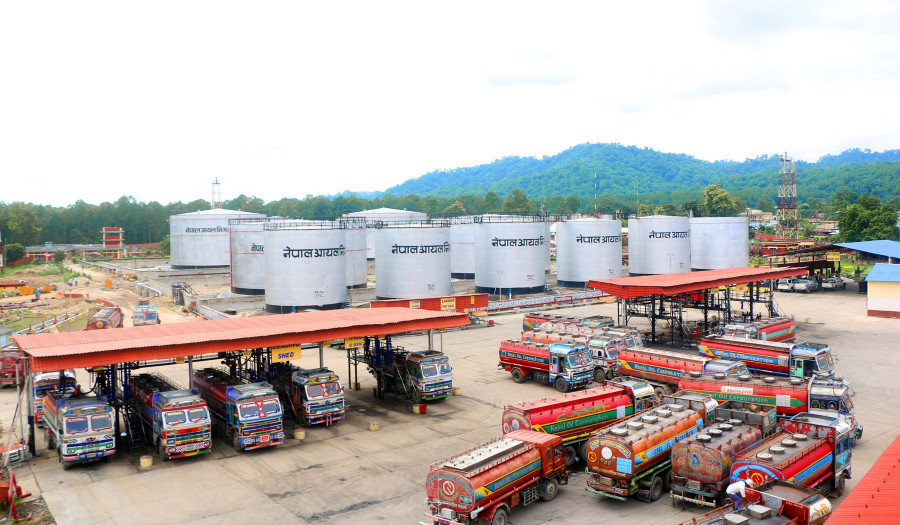National
Oil Corporation increasingly anxious about piling debt to its Indian supplier
Near bankruptcy, public utility has outstanding payment dues worth Rs22 billion and the sum is expected to rise.
Prithvi Man Shrestha
Nepal Oil Corporation has about Rs22 billion in outstanding dues to be paid to the Indian Oil Corporation as of June 23. With the government not implementing its own decision of compensating the state-owned oil monopoly for reduction of fuel prices so far, officials at the corporation expect the dues to rise in the days to come.
Now, their fear is that the NOC may be forced to pay interest on the dues to be paid to the Indian supplier.
“We had paid interest for the dues in 2014 to the IOC when it piled up after failing to make payments on time,” said Nagendra Sah, deputy managing director of the finance/administration section of the NOC. “Now, there is this possibility that we may have to pay interest if dues continue to go up for failure to pay on time.”
The difference this time is that the dues to be paid to IOC are much higher than in 2014.
“So, the interest to be paid will also be higher which may hit the finances of the NOC further,” said Sah. He expects the dues to be paid will rise by Rs4-5 billion when he gets bills from the IOC on July 8 about petroleum products supplied in June.
Officials at the NOC say that they have been making payments to IOC every week from the amount being collected from the market but the amount is not sufficient to cover the increasing liability amid rising prices of petroleum products.
In March 2014, the NOC had outstanding dues of Rs4 billion to be paid to the IOC. In response, the Indian oil supplier had curtailed the supply of petroleum products by 25 percent.
Due to high oil prices in the international market and the lack of an automatic price adjustment mechanism in the country, the NOC had suffered financially for selling petroleum products at prices lower than their costs in 2014.
The NOC then adopted an auto-pricing mechanism in September 2014, which has been implemented most of the time over the last several years.
Amid the Russia-Ukraine war, the prices of petroleum products have skyrocketed and the government has not allowed the NOC to make automatic price adjustments in view of resulting public outrage and inflation fears.
Except in kerosene and aviation fuel, NOC has been incurring losses in every other petroleum product, including petrol, diesel and cooking gas, according to the state-owned oil monopoly.
Nepal oil officials said the IOC has not yet notified them about the interest that NOC is required to pay.
“Usually, the IOC passes on the interest that the Indian supplier has to pay to the State Bank of India for cash credit it receives to buy oil from abroad,” said Shah. “As per my information, such interest being paid by IOC is around 7.5 percent currently but the Indian supplier has not yet notified us that it will pass on this interest to us.”
Nepal Oil officials say the fact that they need to pay the interest is not a matter of if but when, and that time is running out.
“Failure to pay the dues for a prolonged period also dents the image and prestige of the country,” said Sah. “It is not just a business relationship between the NOC and the IOC. We have been putting pressure on the government to help us clear the dues.”
Because of ballooning losses, NOC has been failing to pay fully for the oil supplied by the IOC. NOC announced on June 19 that it is incurring monthly losses of Rs4.7 billion even after a record rise in petroleum prices the same day.
The government announced reduction of diesel and petrol prices by Rs29 and Rs20 per litre on June 25, saying that the deficit would be adjusted by slashing taxes. The decision has not yet been implemented yet, forcing NOC to continue to pay the taxes.
“If we are not compensated for the reduced prices, our monthly losses will reach Rs9.67 billion,” Binitmani Upadhyay, spokesperson for NOC, told the Post early this week.
In recent months, the situation aggravated as oil prices surged due to the Russia-Ukraine war and sanctions imposed by the western countries on Russia over its invasion of Ukraine. On June 19, the NOC said it is expected to incur a loss of Rs50-55 billion by the end of the current fiscal year.
NOC declared itself debt free in July 2016 for the first time in 14 years after paying off all loans totaling Rs36.87 billion owed to the government, banks and financial institutions, the Employee Provident Fund and the Citizen Investment Trust. But now it is on the verge of bankruptcy again.
In late May, Sushil Bhattarai, deputy managing director of NOC, told the Post that the oil monopoly had already used Rs14.5 billion from the price stabilisation fund and Rs7 billion from its internal fund.
NOC is now preparing to take a loan of Rs3 billion from Rastriya Banijya Bank.
“The Finance Ministry has approved our proposal of getting loans from the bank,” said Upadhyay, the spokesperson for the oil company.




 18.12°C Kathmandu
18.12°C Kathmandu














